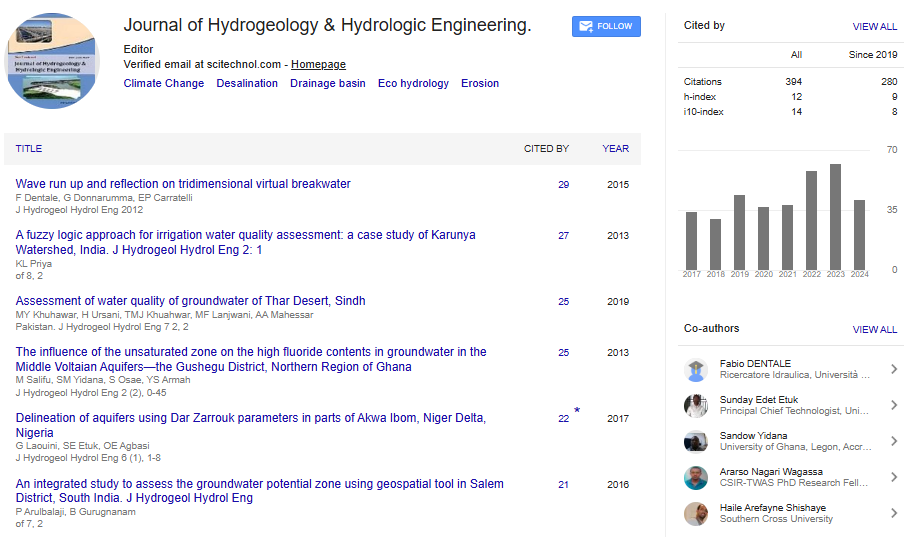Perspective, J Hydrogeol Hydrol Eng Vol: 13 Issue: 1
Ensuring Water Quality: The Importance of Monitoring and Maintenance
Michael Chimney*
1Department of Agriculture, The University of Melbourne, Victoria, Australia
*Corresponding Author: Michael Chimney,
Department of Agriculture, The
University of Melbourne, Victoria, Australia
E-mail: chimneym8@gmail.com
Received date: 22 January, 2024, Manuscript No. JHHE-24-132075;
Editor assigned date: 24 January, 2024, PreQC No. JHHE-24-132075 (PQ);
Reviewed date: 08 February, 2024, QC No. JHHE-24-132075;
Revised date: 16 February, 2024, Manuscript No. JHHE-24-132075 (R);
Published date: 23 February, 2024, DOI: 10.4172/2325-9647.1000312
Citation: Chimney M (2024) Ensuring Water Quality: The Importance of Monitoring and Maintenance. J Hydrogeol Hydrol Eng 13:1.
Description
Water quality is a precarious aspect of environmental sustainability, as it affects the health and well-being of both humans and ecosystems. Ensuring the quality of water is essential for maintaining the health of aquatic ecosystems, drinking water supplies, and agriculture. In this article, we will discuss the importance of monitoring and maintaining water quality, and the potential consequences of neglecting to do so.
Water quality is important for several reasons
Human health: Water is essential for human health, and the quality of water determines the safety of drinking water. Contaminated water can cause waterborne diseases, such as cholera, typhoid, and diarrhea, which can lead to serious health problems and even death. Aquatic ecosystems: Water quality affects the health of aquatic ecosystems, including rivers, lakes, and wetlands. Poor water quality can lead to the decline or extinction of aquatic life, as well as the degradation of habitats.
Agriculture: Water quality is essential for agriculture, as irrigation systems rely on clean water to support crop growth. Contaminated water can reduce crop yields, affecting food security and the economy.
Industry: Water quality is precarious for industrial processes, such as manufacturing and mining, which rely on clean water for efficient operation.
Ecosystem services: Water quality affects the provision of ecosystem services, including flood protection, water storage, and nutrient cycling.
Monitoring water quality
Monitoring water quality is essential for understanding the health of aquatic ecosystems, identifying potential pollution sources, and developing effective management strategies. Water quality monitoring involves measuring various physical, chemical, and biological parameters, such as:
Temperature: Water temperature affects the metabolism and survival of aquatic organisms.
pH: pH measures the acidity of water, which affects the availability of essential nutrients for aquatic life.
Dissolved oxygen: Dissolved oxygen levels determine the amount of oxygen available for aquatic organisms.
Nutrients: Excess nutrients, such as nitrogen and phosphorus, can lead to eutrophication, which can cause harmful algal blooms and deplete oxygen levels.
Heavy metals: Heavy metals, such as mercury and lead, can accumulate in aquatic organisms and cause reproductive and developmental problems.
Maintenance of water quality
Maintaining water quality requires a combination of technological, administrative, and social interventions. Some of these interventions include:
Wastewater treatment: Wastewater treatment plants remove pollutants and pathogens from wastewater, ensuring that it is safe for discharge into aquatic ecosystems.
Stormwater management: Stormwater management systems, such as ponds and wetlands, help to filter and absorb pollutants from runoff, preventing them from entering aquatic ecosystems.
Best Management Practices (BMPs): BMPs are practices or technologies used to reduce the amount of pollutants entering aquatic ecosystems, such as fertilizer application and animal waste management.
Water conservation: Water conservation measures, such as efficient irrigation systems and low-flow appliances, reduce the amount of water used, which in turn reduces the amount of wastewater generated.
Public education and outreach: Educating the public about the importance of water quality and the consequences of poor water quality can help to change behaviors and attitudes towards water use and conservation.
Conclusion
Water quality is a precarious aspect of environmental sustainability, and its maintenance is essential for maintaining the health of aquatic ecosystems, drinking water supplies, and agriculture. Monitoring and maintaining water quality requires a combination of technological, administrative, and social interventions, as well as public education and outreach. By prioritizing water quality management, we can ensure that this precious resource remains available for future generations.
 Spanish
Spanish  Chinese
Chinese  Russian
Russian  German
German  French
French  Japanese
Japanese  Portuguese
Portuguese  Hindi
Hindi 
